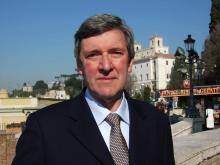When will Pope Francis go to Cairo? That is the question now being asked in Rome following the invitation given by the Grand Imam of Al-Azhar during their historic meeting in the Vatican on May 23.
The imam, Sheik Ahmed al-Tayeb, the highest religious authority in the Sunni Muslim world, invited the pope to visit Al-Azhar during their 25-minute private conversation, Vatican and Egyptian sources told America. The invitation is particularly significant since 85 percent of Muslims are Sunnis, and Al-Azhar, founded in 969 C.E. in Cairo, is the most prestigious center of learning of Sunni Islam. Each year it provides formation for thousands of imams from many countries.
The invitation came as conflict rages in Syria, with persecution of Christians and other minorities by the Islamic State, and as Islamophobia spreads in Europe and in the United States. It is a sign of Al-Azhar’s openness to cooperation with the Holy See in the search for peace and respect for human dignity in the region and in rejecting the use of religion to justify violence and terrorist acts.
To gain an insight into the significance of the May 23 encounter and invitation from an Islamic perspective, I spoke with Omar Abboud, a friend of Francis for many years and director of the interreligious center in Buenos Aires, who has been working behind the scenes to make it happen. The pope invited him to join him, together with Rabbi Abraham Skorka, on his pilgrimage to the Holy Land in May 2014.
Mr. Abboud hailed the sheik’s meeting with Francis as “a historic encounter, like that of the Sultan Malik al Kamil and St. Francis of Assisi during the Crusades some eight centuries ago.” Although “the context of this era is different, it too was an epoch of tensions in relation to religion and in the same geographic scenarios,” he said, referring to St. Francis’ visit to the sultan of Egypt in 1219, opposing the culture of war and enmity in the Crusades.
The Argentine Muslim director described the meeting as “the most significant encounter that Francis has had with the Muslim world,” as “Al-Azhar is the most important institution of the Muslim world because of its tradition, history and the esteem in which it is held in all Muslim countries.” Furthermore, the sheik of Al-Azhar “is respected not only in the Sunni world but also, though to a lesser extent, in the Shiite world. His responsibility is great in the Muslim world; his words carry weight.”
He recalled that this was the first time ever that a sheik of Al-Azhar has visited the Vatican to meet a pope. Francis invited him; he accepted. That encounter reflected “the desire for unity over conflict” and marked “a new stage in Al-Azhar’s relations with the Holy See, which had been interrupted for several years,” Mr. Abboud said, alluding to the breakdown in relations under Pope Benedict XVI.
Although Pope John Paul II visited 23 Muslim countries and made a courtesy visit to Al-Azhar and met Sheik Mohammad Sayyid Tantawi during his pilgrimage to Mount Sinai in February 2000, Mr. Abboud believes that Francis’ approach, words, gestures and visits to Muslim countries and his concern for refugees and an end to the war in Syria have taken Catholic-Muslim relations to a new level.
He revealed that on his travels to many Islamic countries and his conversations with Muslim dignitaries, he has “found great respect for Pope Francis everywhere in the Muslim world.” He added, “I would dare to affirm that he is the pope that is the most loved and most present in the history of the Muslim world.”
He shared Francis’ view about the May 23 encounter: “The meeting is the message.” Indeed, “it is a symbol in itself, and it is now up to the collaborators on both sides to build an agenda of true dialogue.”
He affirmed that “we know perfectly well what are the difficulties and the problems” and declared, “This is the time to move out from the era of analysis and to begin concrete actions.” He thinks the best place to start is in “the field of education” because “to bring the positions closer together, there is a need for mutual cooperation in eliminating prejudices.”
Mr. Abboud is confident Francis will accept the sheik’s invitation to Al-Azhar and believes this can foster closer Christian-Muslim cooperation in the future.








